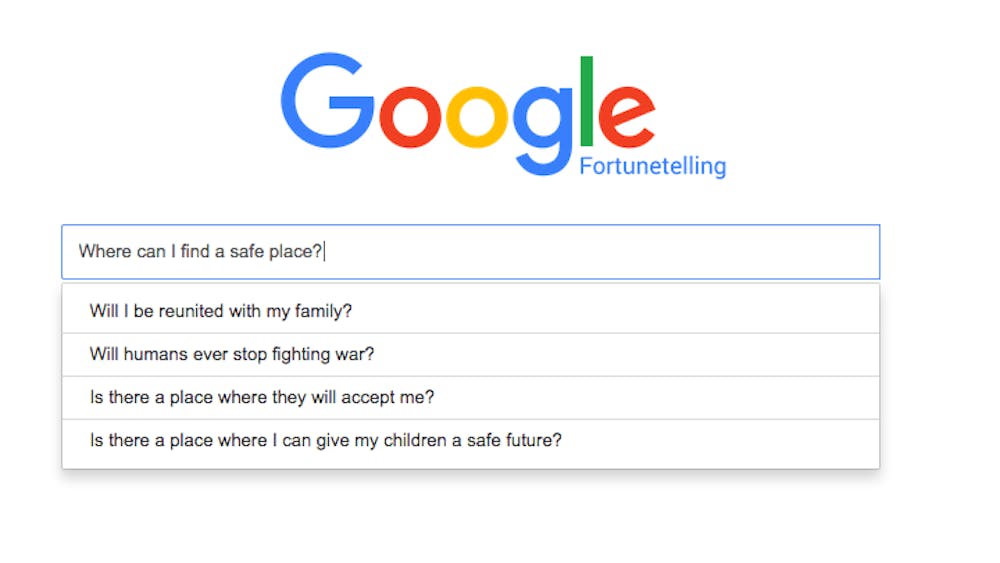There’s a viral link going around for “Google Fortuneteller,” a website that purports to use your search data to give you predictions about your future. When you click on it, you see the traditional search bar, which prompts you to “type in a question about your future.” Once you begin typing, however, the site autocompletes your query to “Where can I find a safe place?” and suggests other questions such as “Will I ever be reunited with my family?” and “Is there a place where they will accept me?”
The user is faced with these questions for a few heartbeats, and is then directed to an explanatory note, which states, “OF COURSE WE CAN'T PREDICT YOUR FUTURE! But 60 million refugees ask themselves every day if they have a future at all… Please take a moment to think of their future.” The page suggests that, beyond simply contemplating the future (or lack thereof) of Syrian refugees, you should share the link for the site on Facebook or Twitter, and continue to “raise awareness.”
Awareness for what? The plight of Syrian refugees? The Syrian conflict itself, which has been eating away at the Syrian population for over four years, and at this point appears interminable?
Why should Americans care about migrants risking their lives across the Atlantic? We have our own problems! Thousands of Central Americans attempt every year to escape violence in their own countries by coming here, and, we don’t exactly accommodate them. Nor, apparently, do we want to: 25 percent of Republicans support a presidential candidate who has in no subtle terms voiced an acutely bigoted suspicion of the denizens of countries below the border, and called for further measures to prevent their members from finding safety in the United States.
Donald Trump’s “call for a wall” is by no means original: Hungarian Prime Minister Viktor Orban recently revealed intentions to build a fence on the border with Croatia to stem the influx of migrants, following the precedent he set with a Serbian border fence, to be completed in November of this year. Orban was explicit about his rationale, claiming the asylum-seekers, many of whom come from majority Muslim countries, would threaten Europe’s so-called Christian nature, making Christians “a minority in [their] own continent.”
President Obama announced plans to resettle 10,000 Syrian refugees to — minimally — mitigate the mounting pressure on European nations; as a symbolic gesture, it should suffice. Why should we continue to care?
Philosopher Peter Singer averred that “if it is in our power to prevent something bad from happening, without thereby sacrificing anything of comparable moral importance, we ought, morally, to do it.” It is relatively uncontested that “suffering and death from lack of food, shelter, and medical care are bad.” If we are moral agents, we should seek to reduce the latter as much as we can to the extent that we do not forgo qualities or goods of “comparable moral importance.” Orban is therefore making the (not unpopular) claim that Europe’s Christian identity — i.e., a homogeneous, largely white national self-conception — is of greater moral importance than Syrian or Afghani lives.
His claim is not by any means eclectic — similar ones have been made by manifold, mostly conservative, politicians in the United States to defend anti-immigration stances. What it boils down to is: the attempt to preserve an imagined and parochial national culture, regardless of how unreflective it is of demographic realities, is more important than tangible lives of those who do not conform to that culture. This is false. It is also practically unsustainable, considering the inevitable processes of globalization and mutating labor needs and flows; but that is secondary.
We must first as moral agents see the importance of aiding refugees. Moreover, as citizens of the United States, we should be able to recognize and respond to the needs of “tired… poor... huddled masses yearning to breathe free..." as well as urge other nations to do the same. We need to care about refugees because that is the point of the United States: the flourishing of various national subcultures that feed into and inform a melting pot of American life.
Finally, immigration is the future: as stated by Arthur Brooks, president of the American Enterprise Institute, Europe’s core problem is “demographic, not economic,” and the only “bright spot” is, well, immigration. According to Brooks, “people are assets to develop, not liabilities to manage,” and amidst a quickly aging and increasingly unproductive population, it should be clear that success and future prosperity do not lie in an Orbanesque Europe, but in a Merkelian one. The former will decay as it ostracizes migrants, and face demographic cleavages that will pose civic and possibly international dangers. The latter will thrive, and serve as a viable economic and cultural partner to the United States.
One of the questions among Google Fortunetellers’ suggestions is, “Will humans ever stop fighting war?” Probably not. We cannot sit, close our eyes — and our borders — and hope for peace. Cruelty is an unfortunate constant, and we as people, as Americans, as partners of Europe, should care, and aim to remedy it.
Tamar Ziff is an Opinion columnist for The Cavalier Daily. She can be reached at t.ziff@cavalierdaily.com.





